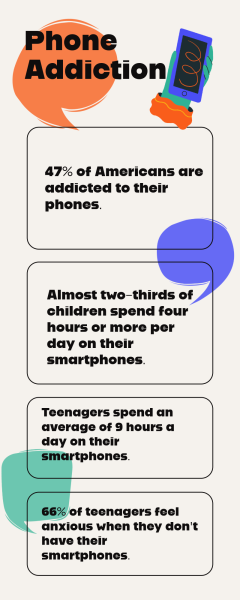In an era where technology has become almost second nature for most teenagers, high school students appear almost tethered to their phones, influencing the way they interact with the world around them. Despite the numerous benefits that technology and AI offer, there is a growing concern about phone addiction among high schoolers that cannot be overlooked. Continue reading to delve into the impact of technology and AI on students’ performance both inside and outside of school, their sleep schedules, and emotional well-being.
The next steps involve addressing and halting the negative effects of phone addiction on teens by involving schools, staff, and parents. This group of adults, being the most influential figures in teens’ lives, can play pivotal roles in fostering a new mindset toward technology. Implementing the use of healthy and balanced examples of tech in classrooms, such as having tech-free periods and encouraging face-to-face social interactions, would be a step in the right direction for achieving a more balanced use of phones.
One significant consequence that immediately comes to mind regarding phone addiction in high schoolers is its effect on academics. The constant presence of social media, texting, and the internet, always within a click of a button, leads to procrastination and distraction during the school day and study sessions. As students find themselves on their phones more frequently, the time spent on assignments and focused in class diminishes due to their almost addicted-like mindset, directly impacting their grades. Research indicates a negative correlation between excessive phone use and academic achievement, emphasizing the need for a balanced approach to technology in education.
High schoolers, already under immense stress with academic pressures, extracurricular activities, and social calendars, often compromise their sleep schedules due to phone addiction. Studies show that “The blue light emitted by screens interferes with the production of melatonin, a hormone responsible for regulating sleep-wake cycles,” adding to their sleep deprivation. The easily accessible device next to their beds tempts them to scroll through social media or engage in online activities late into the night, resulting in inadequate or disrupted sleep. Chronic sleep deprivation not only hampers cognitive functions but also contributes to mood swings. If sleep levels decline significantly, it can even lead to issues like depression, alcohol use, and an overall decline in well-being.
Delving further into the role of phones in the lives of teenagers reveals the impact on emotional health and the overall negative effects screens have on their well-being. Phone addiction has the potential to significantly impact the emotional health of high school students, given the constant exposure to perfectly curated online personas. People tend to present idealized moments of their lives online, leading to heightened stress and anxiety levels and fostering internal competition among teens and their peers. Additionally, according to another study, “the instant gratification and dopamine release associated with social media interactions create a cycle of dependency,” making students vulnerable to mood swings, feelings of inadequacy, and a diminished sense of self-worth.
Phone addiction stands out as one of the most pressing matters in modern society concerning teens and their well-being. As a community, we need to understand and take action against the negative effects technology has on teens’ minds and bodies. By taking steps like educating not only teens but also teachers and providing them with tools and educational programs to offer the necessary help, we can begin to heal from the dangers of phone addiction.

National Help Line 1-800-662-4357









